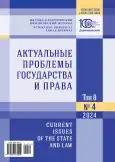Ecological Park as a specially protected natural area of local significance: theory and practice
- Authors: DEMICHEV A.A.1,2
-
Affiliations:
- Nizhny Novgorod Academy of the Ministry of the Interior of the Russian Federation
- Branch of The Russian Presidential Academy of National Economy and Public Administration
- Issue: Vol 8, No 4 (2024)
- Pages: 520-529
- Section: Issues of Private and Public Law
- URL: https://journal-vniispk.ru/2587-9340/article/view/303467
- ID: 303467
Cite item
Abstract
The research analyzes the regional legislation of the Russian Federation, which provides for the existence of ecological parks as a category of specially protected areas of local significance. It has been established that out of 89 subjects of the Russian Federation, only 5 of them (the Republic of Ingushetia, Perm Krai, Lipetsk Oblast, Ulyanovsk Oblast, and the Jewish Autonomous Oblast) provide for such a category of specially protected natural areas of local significance as ecological parks. The legislation of these five regions contains definitions of ecological parks. They indicate the target settings for the creation of ecological parks. They are the broadest in the Republic of Ingushetia, Perm Krai, and the Jewish Autonomous Oblast. The laws of the three named subjects also establish the grounds for recognizing a territory as an ecological park: ecological and aesthetic value. It has been revealed that in reality, ecological parks as specially protected areas of local significance are very rare in Russia. Currently, only two such ecological parks have been created and are successfully functioning (the ecological park of the village of Peshnigort and the ecological park “Yuzhny Les”). Both of them are located in Perm Krai. Another local ecological park, the Black Lake Ecopark, located in the Ulyanovsk Region, has an uncertain legal status. It is concluded that there is no demand for ecological parks as specially protected areas of local significance. The reasons for this are that, firstly, in the regional legislation on ecological parks, this category is practically no different in its legal status from other specially protected natural areas and does not have any specific features compared to them. Consequently, the legislator and law enforcement officer at the regional and municipal levels do not see any particular need to create ecological parks. Secondly, other types of locally protected areas (culture and recreation parks, protected natural landscapes, protected natural sites, etc.) are successfully implemented alternatives to ecological parks in practice.
About the authors
Alexey A. DEMICHEV
Nizhny Novgorod Academy of the Ministry of the Interior of the Russian Federation; Branch of The Russian Presidential Academy of National Economy and Public Administration
Author for correspondence.
Email: aadem@bk.ru
ORCID iD: 0000-0002-9779-100X
Dr. Sci. (Law), Cand. Sci. (History), Professor, Honorary Worker of Higher Professional Education of the Russian Federation, Professor of the Civil Law and Procedure Department; Chief Researcher of the Science Center
3 Ankudinovskoe Rte., Nizhny Novgorod, 603950, Russian Federation; Chief Researcher of the Science Center; 46 Gagarin Ave., Nizhny Novgorod, 603950, Russian FederationReferences
- Belousova S.V. (2019). Modern conditions of ecological parks development in Russia. Sbornik statei III Mezhdunarodnoi nauchno-prakticheskoi konferentsii “Zelenaya infrastruktura gorodskoi sredy: sovremennoe sostoyanie i perspektivy razvitiya” = Collection of articles of the 3rd International Scientific and Practical Conference “Green Infrastructure of the Urban Environment: Current State and Prospects for Development”. Voronezh, LLC “Konvert” Publ., pp. 109-114. (In Russ.) https://elibrary.ru/yvxrex
- Rakov N.S. (2009). Ecopark “Chernoe ozero” in Ulyanovsk city. Fitoraznoobrazie Vostochnoi Evropy = Phytodiversity of Eastern Europe, no. 7, pp. 89-145. (In Russ.) https://elibrary.ru/nuoihr
- Davydova N.Yu., Cherepova I.S. (2016). A legal framework for the creation and development of specially protected natural areas of local significance (a case study of the Orenburg region). Voprosy rossiiskogo i mezhdunarodnogo prava = Matters of Russian and International Law, vol. 6, no. 10 B, pp. 292-305. (In Russ.) https://elibrary.ru/ykgvlh
- Iz’yurov E.Yu., Ogrodovaya L.Ya. (2015). Legal issues of establishing and developing specially protected natural areas of local significance. Ekologicheskoe pravo = Environmental Law, no. 6, pp. 22-27. (In Russ.) https://elibrary.ru/vbsgvr
- Stadolin M.E., Yamchuk E.V. (2017). Specially protected natural areas of local significance: problems of governance and development. Vestnik Universiteta, no. 3, pp. 195-199. (In Russ.) https://elibrary.ru/vykeny
Supplementary files








